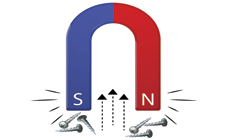What Materials are Magnetic

Listen to this Article
The most common magnetic materials are iron, nickel, and cobalt. These metals are naturally magnetic, meaning they can produce their own magnetic fields. This property is due to the arrangement of electrons in the atoms of these metals. Specifically, the electrons in these atoms are oriented in a way that causes them to spin in the same direction, which generates a magnetic field.
Other magnetic materials include alloys of these metals, such as steel, and rare earth metals, like neodymium and samarium. These materials exhibit magnetic properties due to their unique atomic structure, which allows for the alignment of electron spins.
In addition to these natural magnetic materials, there are also materials that can be magnetized through an external magnetic field. These materials are called ferromagnetic materials and include materials like iron, nickel, and cobalt, as well as some alloys and compounds. When exposed to a magnetic field, the electrons in these materials align themselves in the direction of the field, creating a permanent magnetic field in the material.
There are also materials that exhibit paramagnetic and diamagnetic properties. Paramagnetic materials are weakly attracted to a magnetic field, while diamagnetic materials are weakly repelled. Examples of paramagnetic materials include aluminum and platinum, while examples of diamagnetic materials include copper and gold.
Overall, understanding the properties of magnetic materials is essential for the development of many technologies, including electric motors, MRI machines, and computer hard drives. By understanding the unique properties of these materials, researchers and engineers can design and develop new materials that are better suited for specific applications.
